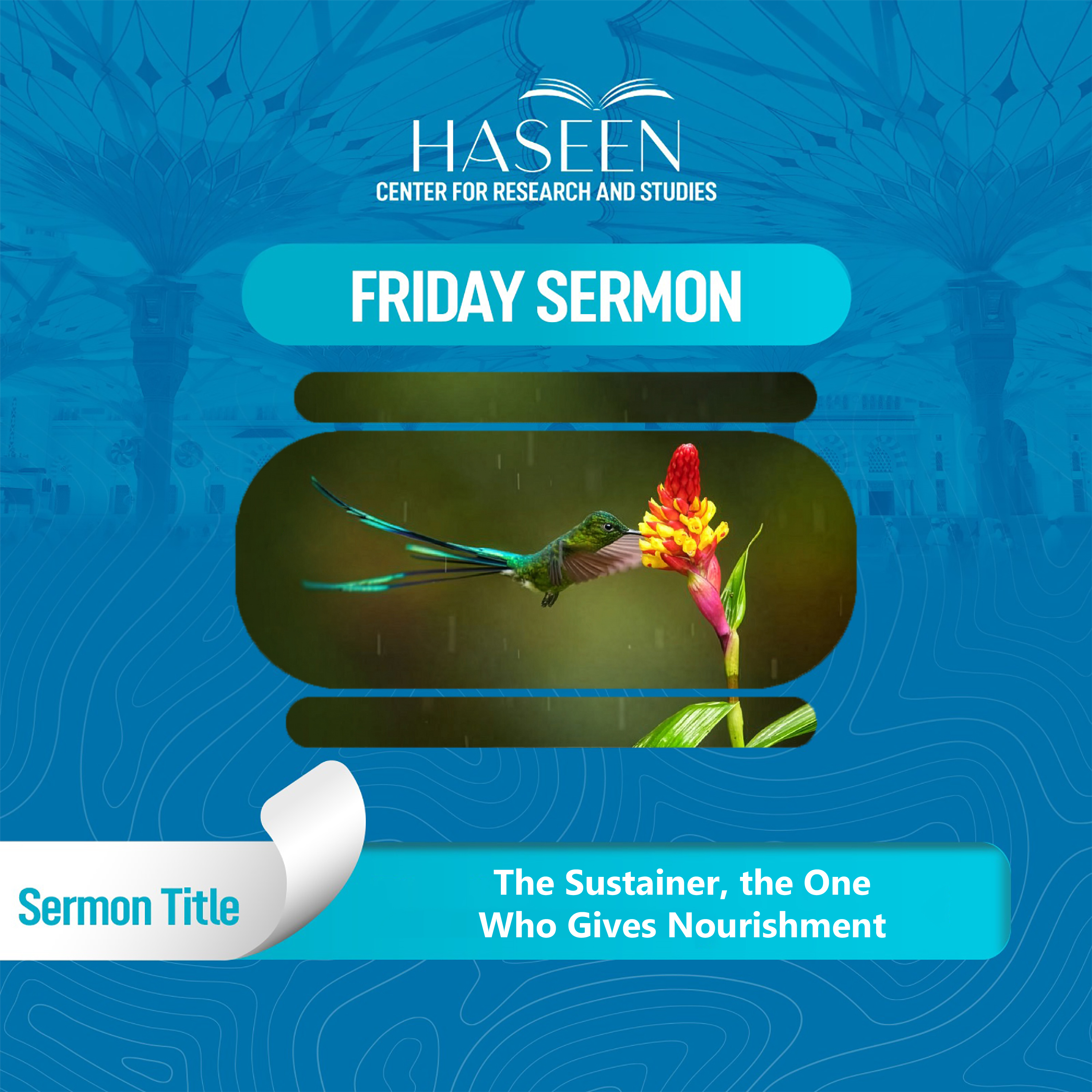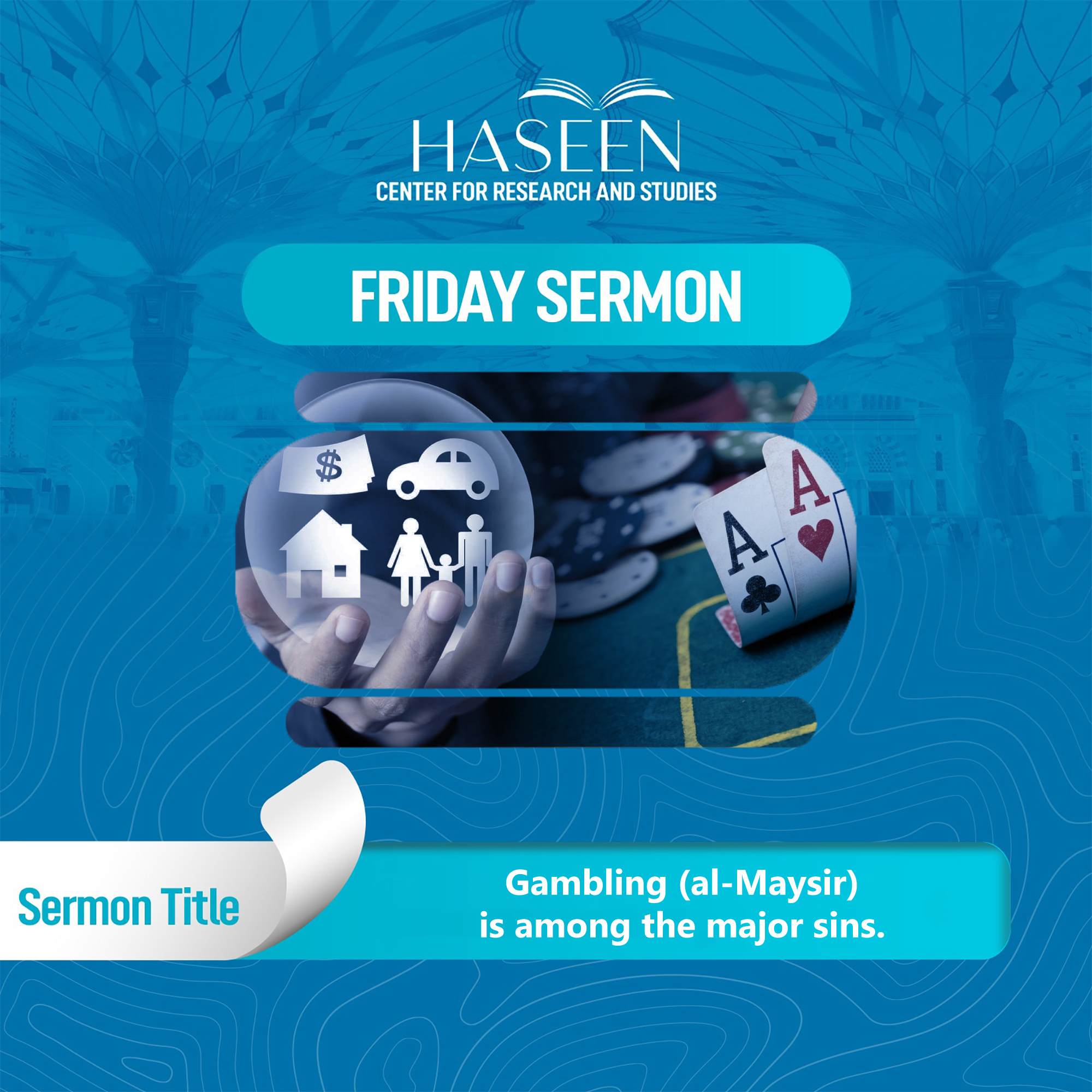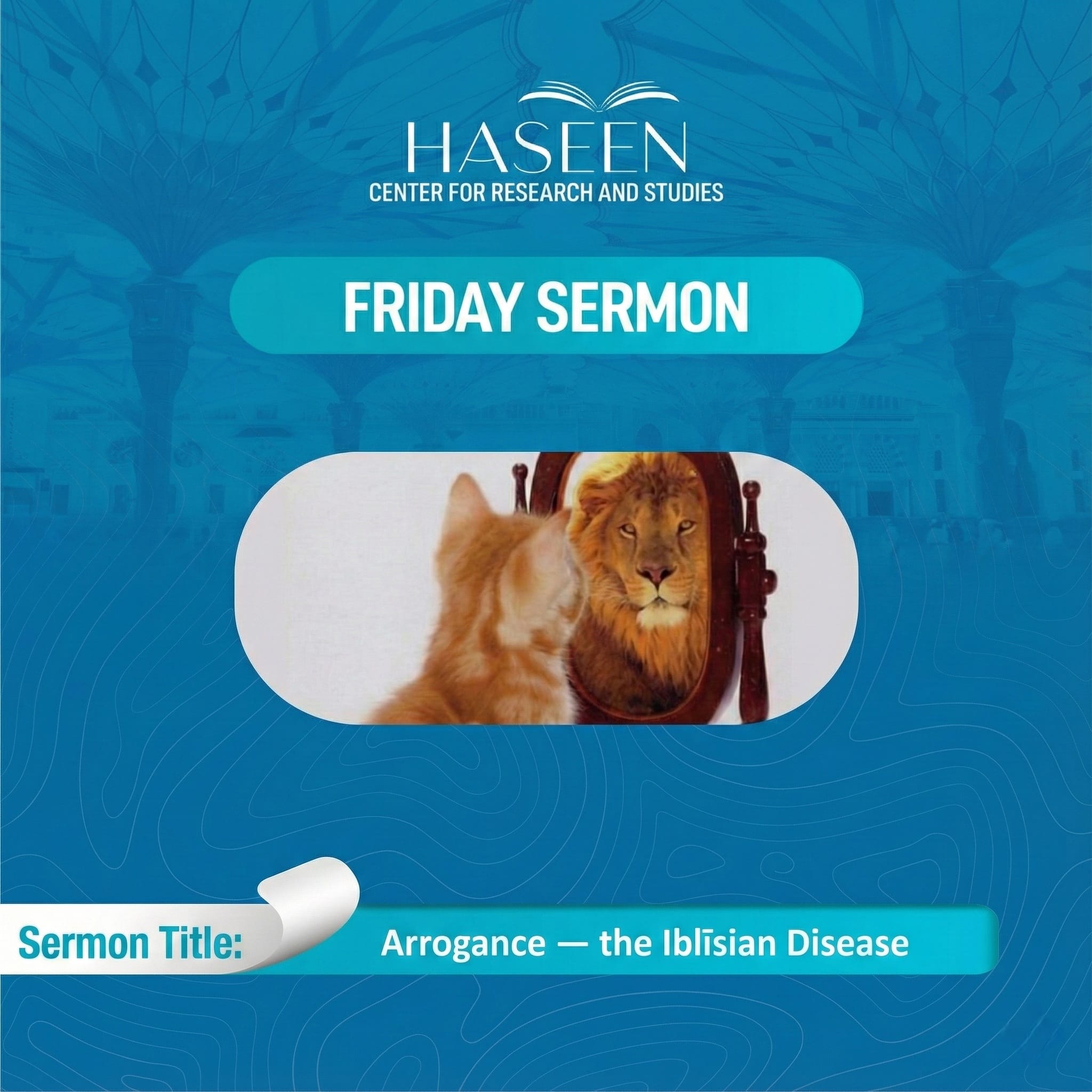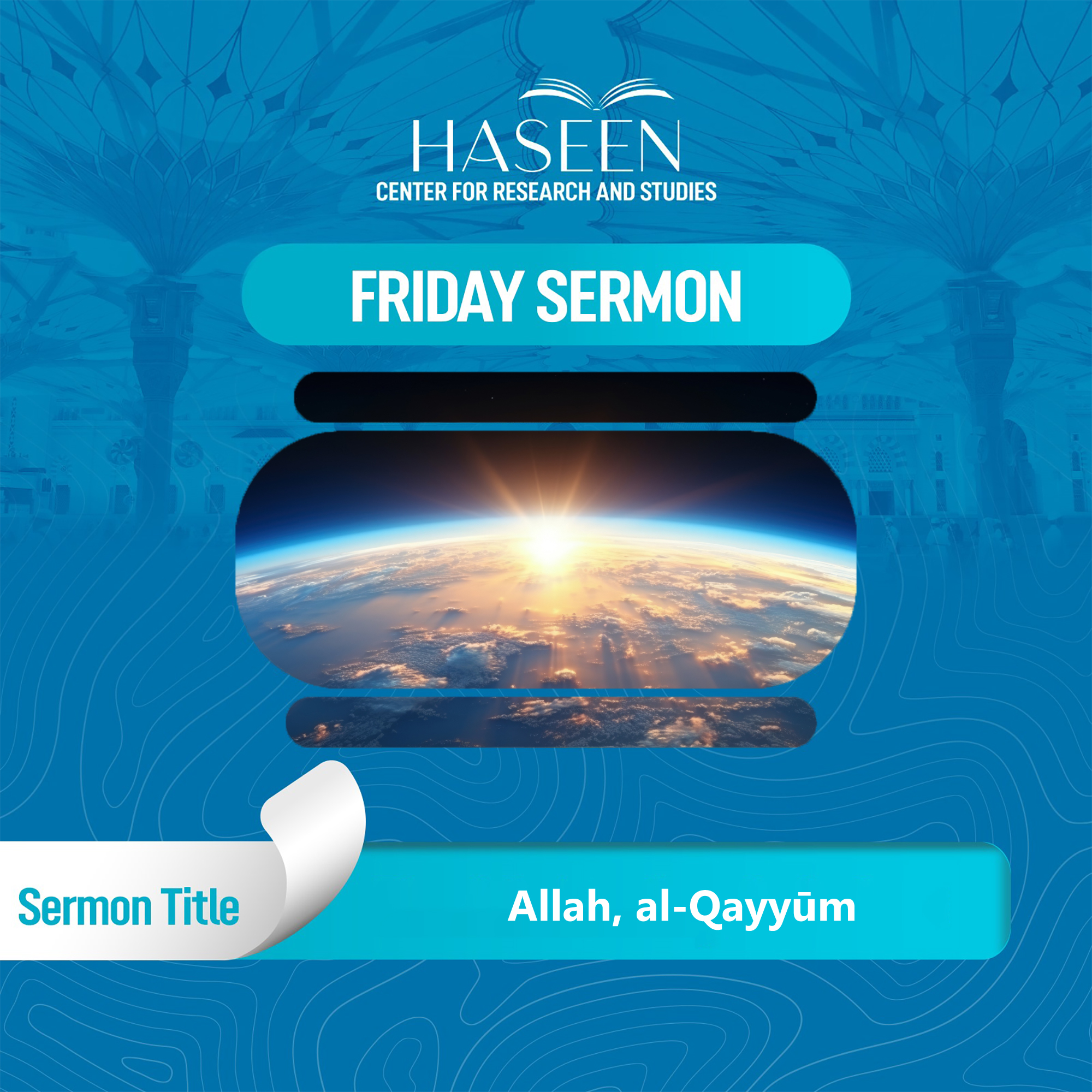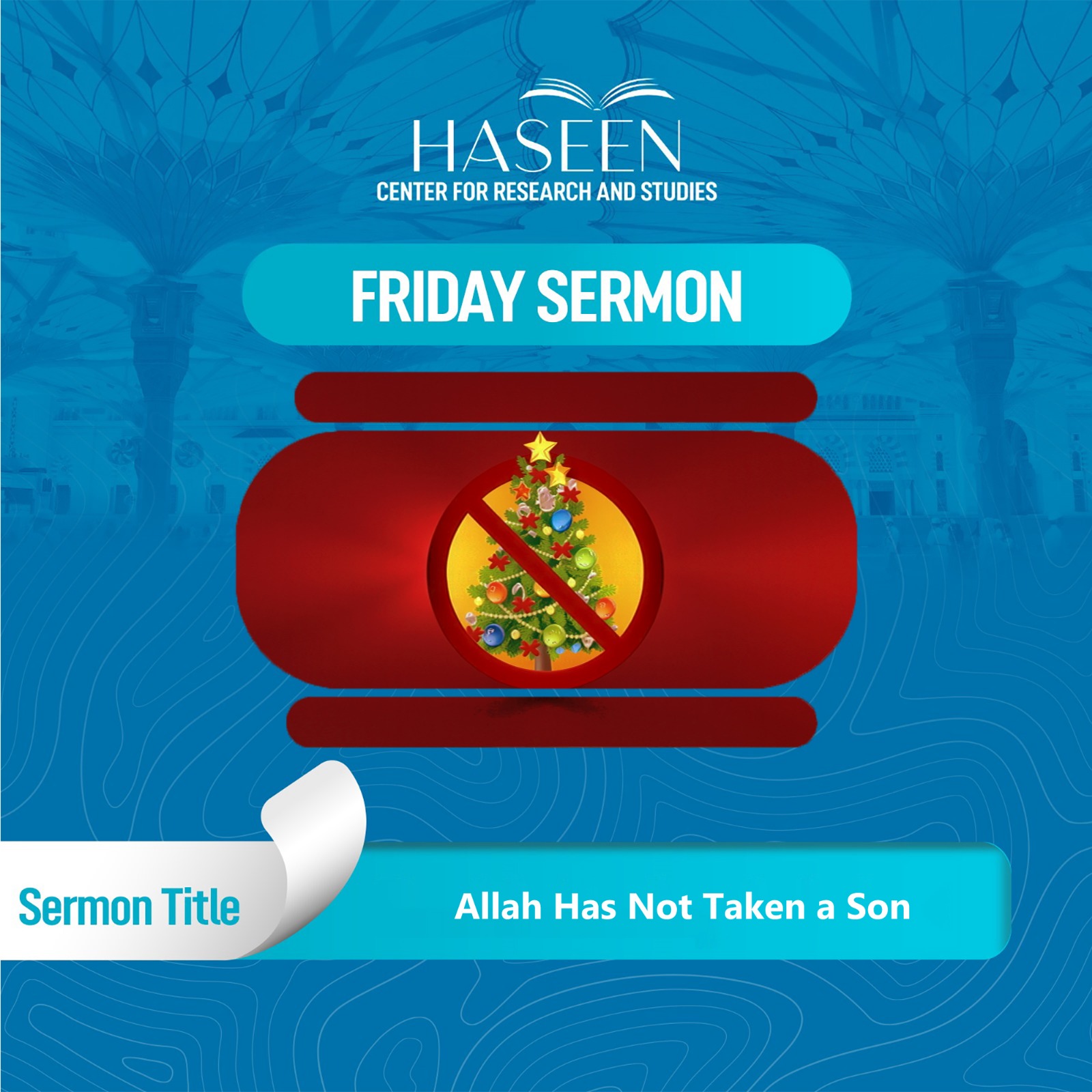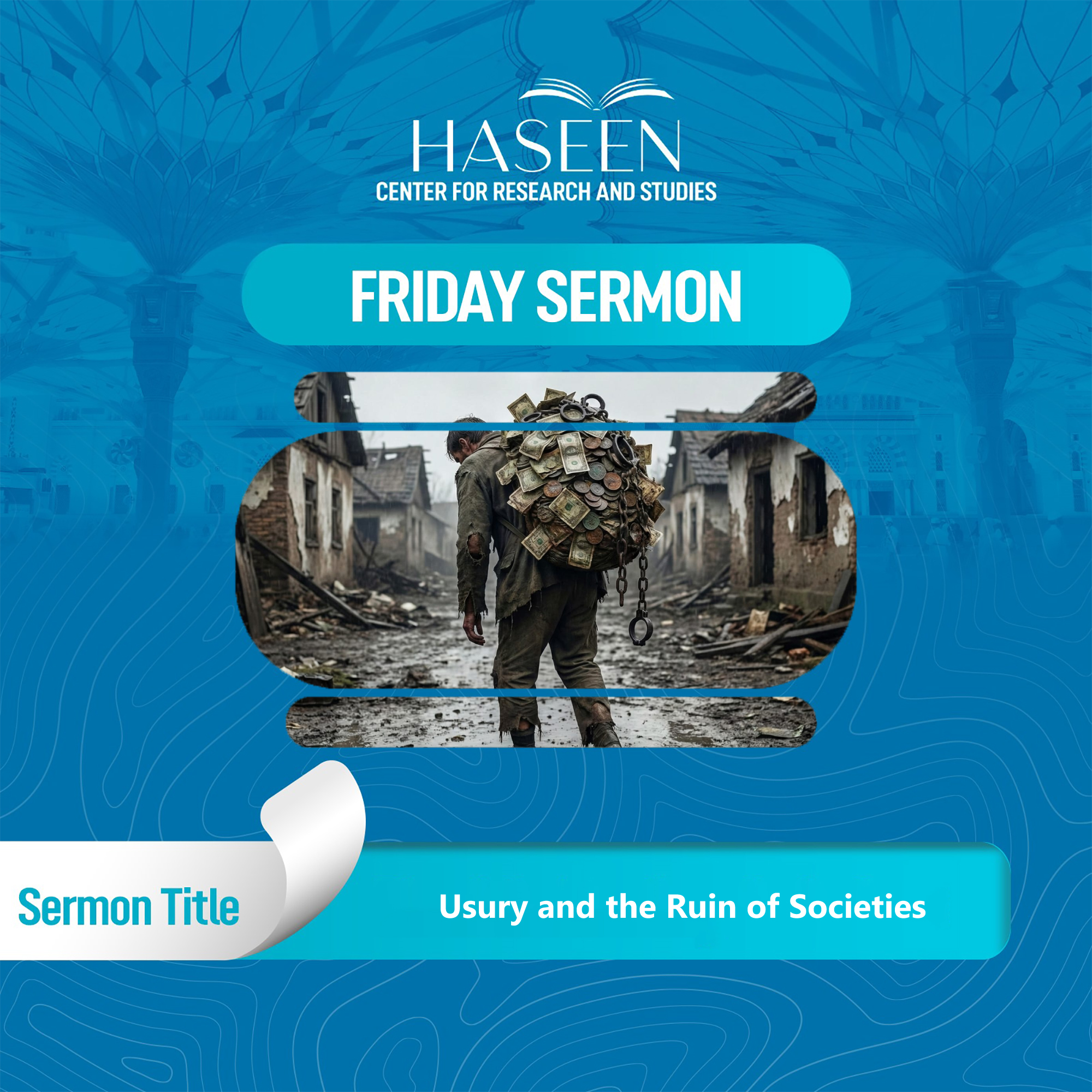Title of the Sermon: The School of Hajj (That They May Witness Benefits for Themselves)
Elements of the Sermon:
The Lesson of Servitude.
The Lesson of Following.
The Lesson of the United Ummah.
Praise be to Allah, whom the monotheists respond to with labbayk, and before whose greatness the humble bow down, and to whose law the believers submit. I bear witness that there is no deity worthy of worship but Allah alone, without partner, and I bear witness that Muhammad is His servant and messenger. May Allah’s peace and blessings be upon him in great measure.
To proceed: Fear Allah, O servants of Allah, true fear of Him, and be mindful of Him in private and public, as He says:
يَا أَيُّهَا الَّذِينَ آمَنُوا اتَّقُوا اللَّهَ حَقَّ تُقَاتِهِ وَلَا تَمُوتُنَّ إِلَّا وَأَنْتُمْ مُسْلِمُونَ
“O you who believe, fear Allah as He should be feared and do not die except as Muslims.” (Sūrat Āl ‘Imrān, 3:102).
O servants of Allah:
Our Lord, Exalted is He, said:
وَأَذِّنْ فِي النَّاسِ بِالْحَجِّ يَأْتُوكَ رِجَالًا وَعَلَى كُلِّ ضَامِرٍ يَأْتِينَ مِنْ كُلِّ فَجٍّ عَمِيقٍ * لِيَشْهَدُوا مَنَافِعَ لَهُمْ
“And proclaim to the people the Hajj pilgrimage; they will come to you on foot and on every lean camel; they will come from every distant pass. That they may witness benefits for themselves.” (Sūrat al-Ḥajj, 22:27-28).
How great is the servitude expressed in Hajj! And how great are its lessons and benefits—benefits encompassing both this world and the Hereafter. Hajj is a magnificent educational and faith-building school, the full extent of which is known only to Allah. Today, however, we focus on three lessons which the ummah is in dire need of these days.
The first lesson of Hajj: It reminds you of the purpose for which you were created—servitude to Allah alone with no partners. As He said:
وَمَا خَلَقْتُ الْجِنَّ وَالْإِنْسَ إِلَّا لِيَعْبُدُونِ
“And I did not create the jinn and mankind except to worship Me.” (Sūrat al-Dhāriyāt, 51:56).
What does Hajj mean? Why did Allah command Ibrāhīm to proclaim the pilgrimage to the people?
Hajj is the journey of a Muslim to the House of Allah to perform acts of worship—statements and actions that bring one closer to the Lord of the Worlds. The pilgrim leaves behind wealth, effort, family, and children, traveling to a land that may be thousands of miles away, seeking only the pleasure of his Lord.
He enters into the state of ihrām in obedience to his Lord, refraining from what has been prohibited—perfume, women, certain clothing—because his Lord has commanded it. He circumambulates the House of his Lord and walks between al-Ṣafā and al-Marwah in servitude to his Master, spends nights in Minā, stands on ‘Arafah, and sleeps in al-Muzdalifah, forsaking comfort and luxury, all for one purpose: O Lord, may You be pleased! He sacrifices his offering and throws the pebbles, feeling in his heart that he is a servant drawing near to his magnificent and exalted Lord, who alone deserves worship, love, and humility.
In this age where mankind is being deified and worship diverted from Allah to man, the lesson of servitude becomes even more significant. Some try to strip acts of worship of their connection to Allah, reducing them to mere rituals meant to benefit man’s worldly life. They look for physical benefits or worldly effects of worship to justify it or to reject it.
Reflect on this ḥadīth, which speaks of the true pilgrim:
The Prophet ﷺ said: “Indeed, Allah boasts to His angels on the afternoon of ‘Arafah about the people of ‘Arafah, saying: ‘Look at My servants, disheveled and dusty, who have come to Me!’” (Narrated by Aḥmad).
“Disheveled and dusty” – this is the purpose and the goal. Only a servant who believes in his Lord, loves his Master, magnifies His Majesty, and acknowledges His blessings and generosity, can understand that goal.
The second lesson, O servants of Allah: From the pillars of servitude is to follow the law prescribed by the Lord of the Worlds—without objection, without addition or omission, without excess or negligence. It is submission and surrender, humility and compliance. Allah says:
اتَّبِعُوا مَا أُنْزِلَ إِلَيْكُمْ مِنْ رَبِّكُمْ وَلَا تَتَّبِعُوا مِنْ دُونِهِ أَوْلِيَاءَ قَلِيلًا مَا تَذَكَّرُونَ
“Follow what has been revealed to you from your Lord and do not follow other allies besides Him. Little do you remember.” (Sūrat al-A‘rāf, 7:3).
How clear is this lesson in the rites of Hajj!
Allah prescribed Hajj during a specific time of the year. He established certain spatial boundaries (Mawāqīt) that a pilgrim must not cross without entering into ihrām. It is not prescribed for one to enter ihrām before these points out of extra devotion, because you are a servant of Allah, following His law and instructions on how to worship Him.
A man once asked Imām Mālik ibn Anas: “From where should I enter into ihrām?” Mālik said: “From where the Messenger of Allah ﷺ entered into ihrām.” The man said: “What if I add to that?” Mālik replied: “Do not do so, for I fear for you the fitnah!” The man said: “What fitnah is there in this? It’s just a few extra miles!” Mālik said: “Allah says:
فَلْيَحْذَرِ الَّذِينَ يُخَالِفُونَ عَنْ أَمْرِهِ أَنْ تُصِيبَهُمْ فِتْنَةٌ أَوْ يُصِيبَهُمْ عَذَابٌ أَلِيمٌ
‘Let those beware who dissent from His command, lest a trial strike them or a painful punishment.’” (Sūrat al-Nūr, 24:63).
The man asked: “What trial could there be in this?” Mālik replied: “Is there any trial greater than thinking you have achieved a virtue that the Messenger of Allah ﷺ himself did not attain? Or thinking your preference is better than that of Allah and His Messenger?!” (Reference: Mālik).
You arrive at the Sacred House, you circumambulate seven times, and you walk between al-Ṣafā and al-Marwah seven times—this is how you fulfill the rites, without addition or omission.
If you perform Ṭawāf, Allah has legislated for you in Ṭawāf to uncover the right shoulder (iḍṭibā‘) and to walk briskly (raml) during the first three rounds. Then you reflect: why was this Sunnah prescribed, and why has it been established until the Day of Resurrection?
The Prophet ﷺ entered Makkah with his companions to perform ʿUmrah before the conquest of Makkah. The polytheists said, "They are coming to you, weakened by the fever of Yathrib." So the Prophet ﷺ commanded them to jog during the first three circuits and to walk between the two corners, so the polytheists would see their strength. The polytheists said, "These are the ones you claimed to be weakened by fever! They are stronger than this or that." (Narrated by al-Bukhārī and Muslim)
But where were the polytheists of Makkah after Allah had granted its conquest? The truth came, and falsehood vanished. So why do we still perform this act today?
ʿUmar ibn al-Khaṭṭāb (may Allah be pleased with him) answers us, saying: "Why do we still jog today and expose our shoulders when Allah has established Islam and driven out disbelief and its people? Nonetheless, we will not abandon anything we used to do during the time of the Messenger of Allah ﷺ." (Narrated by Abū Dāwūd)
You circumambulate the House, and if Allah allows you to reach the Black Stone, He has legislated for you to kiss it—not to venerate it. You kiss it as an act of Sunnah and following the example of the Prophet, just as ʿUmar ibn al-Khaṭṭāb said after kissing the Black Stone: "I know that you are a stone, you do not harm nor benefit. If I had not seen the Prophet ﷺ kiss you, I would not have kissed you." (Narrated by al-Bukhārī and Muslim)
The pilgrim picks up those small pebbles to throw at the jamarāt, with a known number and size, in servitude, submission, and following the Prophet ﷺ, who said to Ibn ʿAbbās (may Allah be pleased with him) during his pilgrimage: "Hand me some pebbles." He said: "So I picked up for him some pebbles like chickpeas." When I put them in his hand, he said: "Like these, and beware of exaggeration in religion, for those before you were only destroyed by exaggeration in religion." (Narrated by al-Nasāʾī)
Have you seen? Pebbles the size of chickpeas, no larger than that. He warns his ummah against exaggeration, even concerning the size of a pebble.
Allah completed the religion and revealed this verse on the Day of ʿArafah during the Farewell Pilgrimage. He said:
الْيَوْمَ يَئِسَ الَّذِينَ كَفَرُوا مِنْ دِينِكُمْ فَلَا تَخْشَوْهُمْ وَاخْشَوْنِ الْيَوْمَ أَكْمَلْتُ لَكُمْ دِينَكُمْ وَأَتْمَمْتُ عَلَيْكُمْ نِعْمَتِي وَرَضِيتُ لَكُمُ الْإِسْلَامَ دِينًا
"This day those who disbelieve have despaired of your religion; so fear them not, but fear Me. This day I have perfected for you your religion and completed My favor upon you and have approved for you Islam as your religion." (Sūrat al-Māʾidah, 5:3)
The religion has been perfected, with no deficiency. Therefore, it is built on submission and following, not on objection and innovation.
May Allah bless me and you with the Noble Qur’an, and benefit us with what is in it of verses and wise remembrance. I seek forgiveness from Allah for myself and for you; seek His forgiveness, for He is the Most Forgiving, the Most Merciful.
The Second Sermon
All praise is due to Allah, and may peace and blessings be upon the Messenger of Allah, his family, his companions, and those who follow him.
Servants of Allah:
Do you know what name Allah has called us in Sūrat al-Ḥajj?
Allah the Exalted says:
هُوَ سَمَّاكُمُ الْمُسْلِمِينَ
“It is He who has named you Muslims” (Sūrat al-Ḥajj, 22:78).
This ummah has been chosen by Allah for a unifying name that gathers its members despite their differing races, colors, lineages, and languages. He named them Muslims—a supreme identity that conveys the essence of a nation whose way of life is submission to Allah’s command. They support one another based on the name of Islam, undivided by racial nationalism or artificial borders.
Look at the pilgrims who have come from all corners of the world, with different colors, races, lineages, customs, and languages. Yet they are all united: their Lord and God is one, their religion is one, their Book is one, their law is one. They believe in all the prophets and in the final messenger, Muḥammad ﷺ. They stand together at the same time, in the same place, worshipping and turning to the One Lord, declaring to the world that they are one united ummah.
This lesson—the lesson of the united ummah—is one we desperately need today, after enemies have divided us with borders, nationalisms, and tribalistic ignorance, so that each Muslim now identifies first with artificial borders and fabricated nationalities, showing loyalty and enmity based on them, working for them, loving and hating for their sake, helping and abandoning because of them.
The Prophet ﷺ stood on the day of ʿArafah and delivered a sermon to his companions, saying: “Verily, every aspect of the pre-Islamic era is under my foot, abolished.” (Narrated by Muslim)
And from that ignorance is for a person to align himself in partisanship, action, loyalty, and enmity to anything other than Islam.
The Prophet ﷺ said: “Whoever claims the call of the pre-Islamic era will be among the inhabitants of Hell.” A man said: “O Messenger of Allah, even if he prays and fasts?” He replied: “Even if he prays and fasts. So call with the call of Allah who has named you Muslims, believers, servants of Allah.” (Narrated by al-Tirmidhī)
The Prophet ﷺ set the rule, saying: “The Muslim is the brother of the Muslim; he does not oppress him, nor does he forsake him.” (Narrated by al-Bukhārī and Muslim)
And he ﷺ said: “The believers are equal in their blood; they are united against others, and the protection given by the least of them is binding on all.” (Narrated by al-Nasāʾī)
Any Muslim, in any corner of the world, the Muslims rejoice at his joy and grieve at his sorrow; his affliction is theirs; they do not abandon him nor forsake him.
What if this lesson were alive in the lives of Muslims today?
O Allah, grant victory to Islam and honor to the Muslims, destroy the criminal Jews, send tranquility into the hearts of the mujahideen in Your cause, deliver Your oppressed servants, and raise the banner of the religion by Your might, O Strong, O Mighty.
O Allah, forgive the Muslim men and women, the believing men and women, the living and the dead. O Allah, guide our leaders to that which You love and are pleased with, and take them by the forelocks to righteousness and piety.
Our Lord, give us good in this world and good in the Hereafter, and protect us from the punishment of the Fire.
Servants of Allah: Remember Allah with much remembrance, and glorify Him morning and evening. And the last of our call is that all praise is due to Allah, Lord of the worlds.



